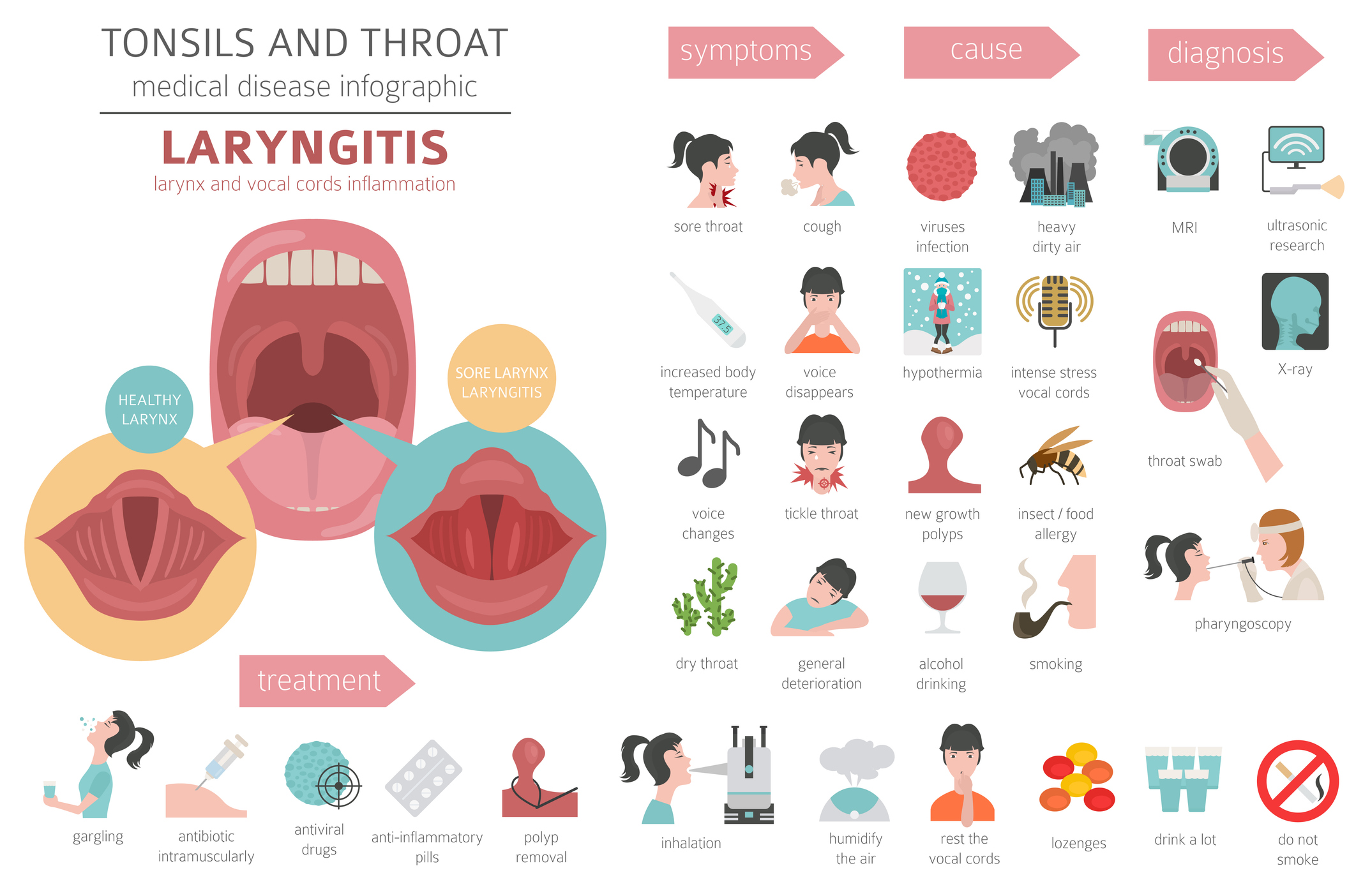What is Hoarseness (Dysphonia)? – Causes, Disorders, and Treatment Options
Hoarseness, also called dysphonia, is a condition that can cause your voice to sound weak, inconsistent, raspy, breathy, strained, or tired. These changes in your voice quality can make speaking difficult and are considered abnormal. Hoarseness is a common condition, affecting an estimated one-third of the population sometime in their lives.
Hoarseness & Dysphonia
In this Throat Cleaner throat diseases blog post, we will explore the various conditions that can result in vocal hoarseness. We will discuss the causes and symptoms so you can recognize the condition and take the necessary steps to reduce or alleviate the symptoms. If you’re interested in topics like swallowing disorders or throat ulcers – we have those guides for you too!

- New Report Says Your Brain Could Be the Key to Reducing Phlegm Over 50
- Doctor's "Leave The Throat Phlegm Behind" Tutorial Goes Viral With People Over 50
- Can You Relieve Throat Phlegm and Coughing In 60 Seconds A Day? This Doctor Says Yes
- How To Banish Phlegm When 50+ (Do This Every Day)
Short Summary
- Vocal hoarseness is caused by laryngitis, upper respiratory infections, vocal strain, Gastroesophageal Reflux Disease (GERD), vocal fold paralysis, vocal nodules, polyps, and cysts, vocal fold hemorrhage, neurological diseases and disorders, and throat cancers.
- Treatment depends on the cause.
- Traditional treatments include vocal rest, voice therapy, drinking water, over-the-counter medicine, and sometimes surgery. Home treatments include drinking plenty of water to keep the voice moist, breathing moist air, avoiding clearing your throat, refraining from smoking or drinking, avoiding whispering, avoiding spicy foods, gargling with saltwater, avoiding caffeine, drinking warm water with honey and lemon juice, and using a throat cleaner.
How the Voice Works
Before delving into factors that cause hoarseness, we must describe how the voice works.
Our voice is produced by the vibration of two bands of smooth muscle tissue called vocal folds (vocal cords) positioned opposite each other in the larynx. The larynx or voice box is located between the base of the tongue and the top of the trachea, the passageway to the lungs.
When we are not speaking, our vocal folds are open to allow us to breathe. However, when it is time to speak, the brain coordinates a series of events. The vocal folds snap together as air from the lungs blows past, causing them to vibrate. These vibrations produce sound waves that travel through the throat, nose, and mouth, which act as resonating cavities to adjust the sound. The size and shape of the vocal folds and resonating cavities determine the quality of our voice, including its pitch, volume, and tone. This is why everyone’s voice sounds different.
The individual variations in our voices result from the amount of tension we apply to our vocal folds. For example, relaxing them makes our voice deeper, while tensing them makes it higher.

Infographic text
Tonsils and Throat medical disease infographic.
Laryngitis
Larynx and vocal cords inflammation
Symptoms
- Sore throat
- Cough
- Increased body temperature
- Voice disappears
- Voice changes
- Sore throat
- Dry throat
- General deterioration
Causes
- Viruses infection
- Heavy dirty air
- Hypothermia
- Intense stress vocal cords
- New growth polyps
- Insect/food allergy
- Alcohol drinking
- Smoking
Diagnosis
- MRI
- Ultrasonic research
- Throat swabs
- X-ray
- Pharyngoscopy
Treatment
- Gargling
- Antibiotic
- Antiviral drugs
- Anti-inflammatory pills
- Polyp removal
- Inhalation
- Humidify the air
- Rest the vocal cords
- Lozenges
- Drink a lot
- Do not smoke
End Infographic Text
Causes of Hoarseness
Several factors can play a role in vocal hoarseness, most benign. Causes of hoarseness include:
Laryngitis
Laryngitis is the most common cause of a hoarse voice. It is a condition characterized by larynx inflammation and can be acute (short-term) or chronic (long-term).
Acute laryngitis is typically caused by an upper respiratory infection, such as the common cold or the flu. It can also be caused by excessive usage and stress of the voice, such as yelling or talking for an extended period without a break.
Chronic laryngitis is a condition that persists for longer than three weeks (1) and can be caused by allergies or exposure to substances that irritate the larynx, such as cigarette smoking or dust.
Upper Respiratory Infection
An upper respiratory viral infection like the common cold can often cause vocal hoarseness, sore throat, difficulty swallowing, and other symptoms. These symptoms should resolve on their own within two weeks.
Vocal Strain
Vocal strain is one of the most common causes of temporary hoarseness.
Short-term vocal strain can be triggered by shouting during athletic competitions, conversing loudly in noisy environments, talking for prolonged periods without taking breaks, belting out songs, or utilizing an excessively high or low voice.
Constant or chronic hoarseness may afflict individuals who depend on their voices for their profession, such as public speakers, vocalists, or educators.

Gastroesophageal Reflux Disease (GERD)
Gastroesophageal Reflux Disease, or GERD, is a chronic digestive disease where stomach acid repeatedly flows back into your esophagus.
One of the most common symptoms of GERD is heartburn and tightness in the chest, but this condition can also cause hoarseness, especially in the morning, as the acid irritates the tissues in your throat. Sometimes, the acid may reach up to your larynx, causing laryngopharyngeal reflux (LPR). People with LPR may not experience heartburn, but they may feel like they need to clear their throat constantly and may become hoarse.
Regardless of your symptoms, seeking medical attention is important if you suspect you have GERD or LPR.
Vocal Fold Paralysis
Vocal fold paralysis is a condition that affects the voice when one or both vocal folds do not open or close correctly. It can be caused by various factors such as head, neck, or chest injuries, lung or thyroid cancer, skull base, neck, or chest tumors, or infections such as Lyme disease. Individuals with certain neurologic conditions such as Parkinson’s disease or multiple sclerosis or those who have experienced a stroke may also experience vocal fold paralysis. In some instances, the cause of the condition is unknown.
Vocal Nodules, Polyps, and Cysts
Benign (noncancerous) growths, such as vocal nodules, polyps, and cysts, can be found within or along the vocal folds. Professional singers often experience vocal nodules, also known as “singer’s nodes,” as they form in pairs on opposite sides of the vocal folds due to excessive pressure or friction, similar to how a callus forms on the foot from a tight shoe. Vocal polyps, on the other hand, typically occur on only one side of the vocal fold, while vocal cysts are hard tissue masses enclosed in a membrane sac within the vocal fold.

Vocal Fold Hemorrhage
Vocal fold hemorrhage occurs when a blood vessel on the surface of your vocal fold ruptures and fills the tissues with blood. This can happen suddenly during intense vocal use, like yelling, resulting in a sudden loss of voice.
In some cases, the condition may cause hoarseness to develop quickly over a short period, affecting your singing but not your speaking voice. It is essential to seek medical attention if you experience any of these symptoms, as vocal fold hemorrhage can lead to permanent damage if left untreated.
Resting your voice and avoiding further strain on your vocal cords is recommended until you can see a doctor.
Neurological Diseases and Disorders
Hoarseness can be caused by neurological conditions that impact the parts of the brain responsible for controlling the muscles in the throat or larynx. This symptom is often seen with Parkinson’s disease or a stroke. Additionally, spasmodic dysphonia, a rare neurological disorder, can lead to hoarseness and may also impact breathing.
Throat Cancers
One of the most common symptoms of throat cancer is a raspy voice.
So, if you experience hoarseness that persists for more than three weeks, it may indicate throat cancer, such as laryngeal cancer or esophageal cancer.
Fortunately, throat cancer is rare.
Hoarseness Diagnosed
If your hoarseness is unrelated to a viral infection or other obvious health issue, your healthcare provider may refer you to an ear, nose, and throat (ENT) specialist or otolaryngologist.
During your appointment, the ENT specialist will ask about your medical history, medications, symptoms, and any relevant family history or medical conditions.
Once the initial consultation is done, your ENT specialist will listen to your voice and thoroughly examine your head and neck. They will search for unusual bumps in your neck and inspect your voice box using a laryngoscope – a lit tool inserted through your nostrils and into the back of your throat.
If there are any red flags, your healthcare provider may request additional tests, such as an MRI (magnetic resonance imaging) or a CT (computed tomography) scan. If necessary, they may also order a biopsy.
Treatment Options for Hoarseness
Treatment depends upon the underlying cause of hoarseness. The conditions and their typical treatment modalities include:
- Vocal strain: Vocal rest is strongly advised, which involves not using your voice for a few hours or an entire day. Drink plenty of water to moisturize your vocal cords. If you frequently suffer from hoarseness due to excessive use of your voice daily, you may need to consult a speech-language pathologist for voice therapy. You will learn specific exercises to help improve your voice and prevent hoarseness.
- Laryngitis: Your healthcare provider may prescribe antibiotics or corticosteroids depending on the cause and the severity.
- The common cold: You can either let the common cold run its course or opt to take over-the-counter cold medicines, including decongestants and antihistamines
- Gastroesophageal Reflux Disease (GERD): Numerous treatment options exist, including taking antacids, protein pump inhibitors, and H2 receptor blockers. There are also dietary and lifestyle modifications that can help reduce GERD symptoms.
- Vocal fold paralysis: An ENT can perform a straightforward procedure to move a paralyzed vocal fold towards the center, or a more complex surgery may be required.
- Vocal fold hemorrhage: Resting the voice is the treatment of choice for this condition.
- Vocal nodules, cysts, or polyps: If you suffer from vocal nodules, cysts, or polyps, you may benefit from dietary changes and voice therapy with a speech-language pathologist. In some cases, surgery may also be recommended.
- Laryngeal cancer: There are various options available for treatment, including radiation therapy, chemotherapy, immunotherapy, and surgery.
At-Home Treatments for Hoarseness
Below are various ways to relieve a sore throat and/or hoarseness:
- Drink plenty of water to keep the voice moist.
- Breathe moist air by using a humidifier or taking a hot shower.
- Rest your voice frequently, especially if you talk a lot in your job or are a singer.
- Avoid clearing your throat.
- Refrain from smoking or drinking.
- Avoid whispering.
- Avoid spicy foods.
- Gargle with saltwater
- Avoid caffeine
- Drink warm water with honey and lemon juice
- Use a throat cleaner
When to See a Doctor
It’s important to note that a hoarse voice may not always be a cause for concern. It can be a temporary condition experienced by people who excessively use their voice, like shouting or singing.
However, if a hoarse voice persists for more than three weeks without accompanying cold or flu symptoms, it’s advisable to contact a doctor.
Additionally, immediate medical attention is necessary if symptoms like coughing up blood, developing a lump in the neck, experiencing pain while speaking or swallowing, difficulty breathing, or complete loss of voice for a few days occur.
Summary
Maintaining a healthy voice is essential for effective communication. Hoarseness can be bothersome, and if you rely on your voice for work, it can be distressing. To keep your voice in good shape, ensure you drink enough water, avoid caffeine and smoking, and use a microphone or other amplification tool when speaking loudly. If hoarseness persists for three weeks or more, seek advice from a healthcare professional.
Frequently Asked Questions
What can hoarseness be a symptom of?
Many factors can play a role in developing vocal hoarseness, including:
- The common cold
- Laryngitis
- Upper respiratory infections, such as the common cold
- Vocal strain
- Gastroesophageal Reflux Disease (GERD), or basic acid reflux
- Vocal fold paralysis
- Vocal Nodules, Polyps, and Cysts
- Vocal fold hemorrhage
- Neurological diseases and disorders
- Throat cancers
When should I be worried about hoarseness?
Hoarseness can be either short-term (acute) or long-term (chronic). Resting your voice and giving it time may help improve hoarseness. However, if hoarseness persists for more than three weeks, especially if there are no cold or flu symptoms, it’s important to get it checked by a healthcare provider.
Why am I so hoarse but not sick?
Chronic hoarseness is often caused by vocal strain, frequently occurring in individuals who use their voices professionally, such as performing artists, teachers, salespersons, and speakers. Polyps, cysts, or nodules on the vocal cords can also result in a hoarse voice without any other accompanying symptoms.
How do I fix my hoarse voice?
If you’re experiencing a hoarse voice, there are several remedies you can try at home. Resting your voice, drinking warm liquids, using lozenges, and inhaling steam are helpful options. However, it’s important to note that a hoarse voice can also be caused by medical conditions such as acid reflux. If this is the case, treating the underlying issue may be necessary to recover fully.

- New Report Says Your Brain Could Be the Key to Reducing Phlegm Over 50
- Doctor's "Leave The Throat Phlegm Behind" Tutorial Goes Viral With People Over 50
- Can You Relieve Throat Phlegm and Coughing In 60 Seconds A Day? This Doctor Says Yes
- How To Banish Phlegm When 50+ (Do This Every Day)


